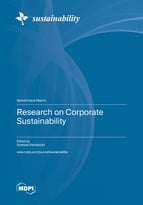Research on Corporate Sustainability
A special issue of Sustainability (ISSN 2071-1050). This special issue belongs to the section "Economic and Business Aspects of Sustainability".
Deadline for manuscript submissions: closed (30 November 2022) | Viewed by 48339
Special Issue Editor
Interests: sustainable business; corporate sustainability; theory building; sustainable leadership; sustainability organizational culture; social enterprise; organizational resilience
Special Issues, Collections and Topics in MDPI journals
Special Issue Information
Dear Colleagues,
As we know, corporate sustainability is of great interest among scholars and practicing managers. However, many fundamental gaps exist in the literature. Among them, a stronger theoretical foundation is needed as researchers in the field need a whole theory to comprehend, describe and forecast events, actions and/or circumstances or even to challenge and progress the current body of knowledge. In terms of practice, ensuring corporate sustainability is highly challenging. Practicing managers still have limited insight into incorporating sustainability strategies and practices within corporations. In my view, corporate sustainability requires management of both internal and external factors since any corporation is simply an entity operating within the society. If the society cannot exist, neither can the corporation.
Therefore, this Special Issue aims at contributing the latest knowledge to the corporate sustainability field. Conceptual, review and empirical papers are welcome. In response to the lack of theory in the corporate sustainability field, papers concerning theory building are of particular interest.
In this issue, we seek answers to the following focal questions: What are factors leading to corporate sustainability? How do they lead to corporate sustainability? Do these factors improve the prospect of organizational resilience?
Topics include, but are not limited to:
- Corporate Sustainability
- Sustainable Supply Chain
- Sustainable Consumption
- Organizational Culture
- Sustainable Leadership
- Sustainable Business
- Social Entrepreneurship
- Sustainable Production
- Stakeholder Management
- Organizational Resilience
Dr. Sooksan Kantabutra
Guest Editor
Manuscript Submission Information
Manuscripts should be submitted online at www.mdpi.com by registering and logging in to this website. Once you are registered, click here to go to the submission form. Manuscripts can be submitted until the deadline. All submissions that pass pre-check are peer-reviewed. Accepted papers will be published continuously in the journal (as soon as accepted) and will be listed together on the special issue website. Research articles, review articles as well as short communications are invited. For planned papers, a title and short abstract (about 100 words) can be sent to the Editorial Office for announcement on this website.
Submitted manuscripts should not have been published previously, nor be under consideration for publication elsewhere (except conference proceedings papers). All manuscripts are thoroughly refereed through a single-blind peer-review process. A guide for authors and other relevant information for submission of manuscripts is available on the Instructions for Authors page. Sustainability is an international peer-reviewed open access semimonthly journal published by MDPI.
Please visit the Instructions for Authors page before submitting a manuscript. The Article Processing Charge (APC) for publication in this open access journal is 2400 CHF (Swiss Francs). Submitted papers should be well formatted and use good English. Authors may use MDPI's English editing service prior to publication or during author revisions.
Keywords
- corporate sustainability
- sustainable supply chain
- sustainable consumption
- organizational culture
- sustainable leadership
- sustainable business
- social entrepreneurship
- sustainable production
- stakeholder management
- organizational resilience






